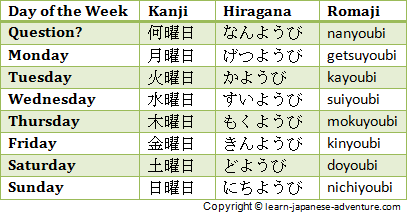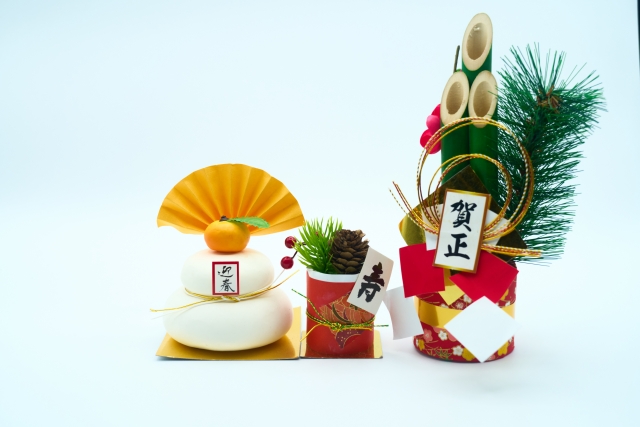Japanese numbers, time, days of the week, etc.
Before we get too much further into Japanese grammar and verb conjugation, I thought it would be a good idea to teach Japanese numbers, time, days of the week, etc.
一 いち ichi one
二 に ni two
三 さん san three
四 し、 よん shi (yon after 10) four
五 ご go five
六 ろく roku six
七 しち、 なな shichi (nana after 10) seven
八 はち hachi eight
九 きゅう kyuu nine
十 じゅう juu ten
百 ひゃく hyaku hundred
Numbers after 10 are a piece of cake once you know 1 through 10. 11 is simply ten with a one after it, 11 (juuichi, juuichi), 12 –juuni, 13 –juusan, 14 –juuyon, etc. 20 is simply twenty (nijuu, nijuu), 21 –nijuuichi, and so forth.

Click here to learn Japanese language with the best one-on-one
Japanese tutoring lessons in person or online.
Put these numbers in front of the character for time and you’ve got the time of the day.
一時 いちじ ichiji one o’clock
二時 にじ niji two o’clock
二時半 にじはん nijihan two thirty (半 means half)
二時四十五分 にじよんじゅうごふん nijiyonjuugofun 2:45 (分 means minute)
…etc.
Now just put the character for moon month after a number and you’ve got a month.
一月 いちがつ ichigatsu January
二月 にがつ nigatsu February
三月 さんがつ sangatsu March
四月 しがつ shigatsu April
…etc.
Japanese days of the week don’t follow such an easy pattern but here they are anyway along with some other time-related words.
日曜日 にちようび nichiyoubi Sunday (日 – sun/day)
月曜日 げつようび getsuyoubi Monday (月 – moon)
火曜日 かようび kayoubi Tuesday (火 – fire)
水曜日 すいようび suiyoubi Wednesday (水 – water)
木曜日 もくようび mokuyoubi Thursday (木 – tree/wood)
金曜日 きんようび kinyoubi Friday (金 – gold)
土曜日 どようび doyoubi Saturday (土 – dirt)
今日 きょう kyou Today
明日 あした ashita Tomorrow
昨日 きのう kinou Yesterday
一昨日 おととい ototoi the day before yesterday
明後日 あさって asatte the day after tomorrow (a small “tsu” (っ) makes a double consonant)
今朝 けさ kesa this morning
今晩 こんばん konban this evening
今 いま ima now
日本語の文法や動詞の活用について詳しく説明する前に、日本語の数字、時間、曜日などを教えるのは良い考えだと思いました。
10の後の数字は、1から10までを知っていれば簡単です。11は、10一(じゅういち、juuichi)、12-juuni、13-juusan、14-juuyonなどです。20は単に二十(にじゅう、にじゅう)、21-にじゅういちなど。
時間時のキャラクターの前にこれらの数字を置くと、その日の時間がわかります。
一時 いちじ ichiji one o’clock
二時 にじ niji two o’clock
二時半 にじはん nijihan two thirty (半 means half)
二時四十五分 にじよんじゅうごふん nijiyonjuugofun 2:45 (分 means minute)
…etc.
今月の文字を数字の後に置くだけで、1か月になります。
日本の曜日はそれほど簡単なパターンには従いませんが、ここではとにかく他の時間関連の単語と一緒にあります。
Related article:










